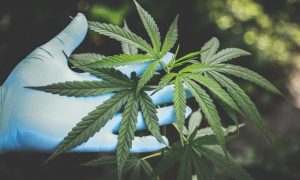On March 20th, CVS Health Corp. announced they intend to sell CBD products in 800 stores across eight states, as part of a distribution deal with Curaleaf Holdings Inc. According to Bloomberg, the announcement sent Curaleaf’s stocks soaring.
CVS will be selling Curaleaf Hemp lotions and CBD transdermal patches in Alabama, California, Colorado, Illinois, Indiana, Kentucky, Maryland and Tennessee. CVS’ total prescription sales revenue makes them the largest drugstore in America. They own nearly 10,000 pharmacy locations. The company also plans to sell products from Axcentria’s Elevate CBD brand.
“These products include topicals such as creams, sprays, roll-ons, lotions and salves. We are not selling any CBD-containing supplements or food additives. We have partnered with CBD product manufacturers that are complying with applicable laws and that meet CVS’s high standards for quality,” CVS said in a statement.
On CNBC, in an interview with financial commentator Jim Cramer, the CEO of CVS, Larry Merlo, said the decision was based on a number of personal anecdotes from countless customers who report they have found relief for arthritis, pain amongst other issues.
Following the announcement, Curaleaf’s stock soared 17 percent in Canadian markets. Curaleaf operates over 40 dispensaries spanning 12 states. The company’s profile of products now includes vape pens, patches, tinctures and lotions.
Exactly a week after CVS’ announcement, Walgreens announced on March 27th that they will also sell an assortment of items infused with CBD including topicals, patches and sprays. The products will be available 9 states and 1,500 Walgreens stores in Oregon, Colorado, New Mexico, Kentucky, Tennessee, Vermont, South Carolina, Illinois and Indiana.
Walgreens did not name the brands of CBD-infused items they will be selling. “This product offering is in line with our efforts to provide a wider range of accessible health and wellbeing products and services to best meet the needs and preferences of our customers,” Walgreens spokesman Brian Faith told CNBC.
According to Fortune, Walgreens’ stocks soared 31 cents per share on the day it was announced.
In a blog post, Walgreens clarified the basics of medical cannabis and how it works. The company even supported the well-known fact that cannabis has been used medically for at least 3,000 years.
While the latest Farm Bill essentially legalized hemp-derived products, and The Centers for Disease Control acknowledges its therapeutic benefits, the FDA bans it as a food additive or as a supplement, and considers it a drug ingredient. The only CBD product approved by the FDA is GW Pharma’s Epidiolex, and it is categorized as a Schedule 5 drug, according to the Controlled Substance Act.
“Based on available evidence, FDA has concluded that THC and CBD products are excluded from the dietary supplement definition under sections 201(ff)(3)(B)(i) and (ii) of the FD&C Act, respectively,” the FDA posted.
So what’s the loophole? Products like topical or sprays, not meant for oral consumption, are not explicitly banned by the FDA. That’s how large companies like Walgreens or CVS appear to be getting away with it. The CBD products that will be carried on those store shelves will surely be free of any unproven health claims, as that is what will get a manufacturer in trouble with the FDA.
It is yet to be seen what will happen when the FDA does begin to issue guidelines or choose to regulate CBD. Expert analysts believe that move would then trigger a highly regulated CBD market just like cannabis regulation, where the little guy gets squeezed out and corporate takes over. Only time will tell.
B. Le Grand



























